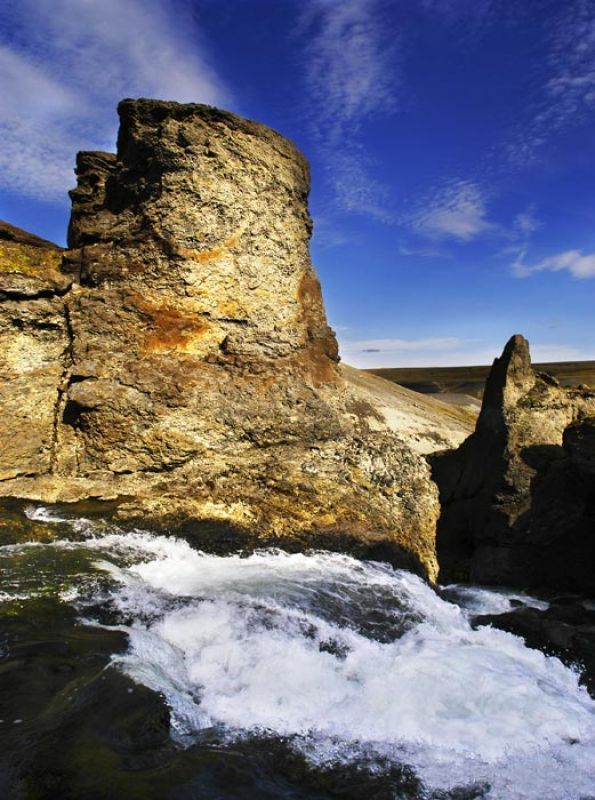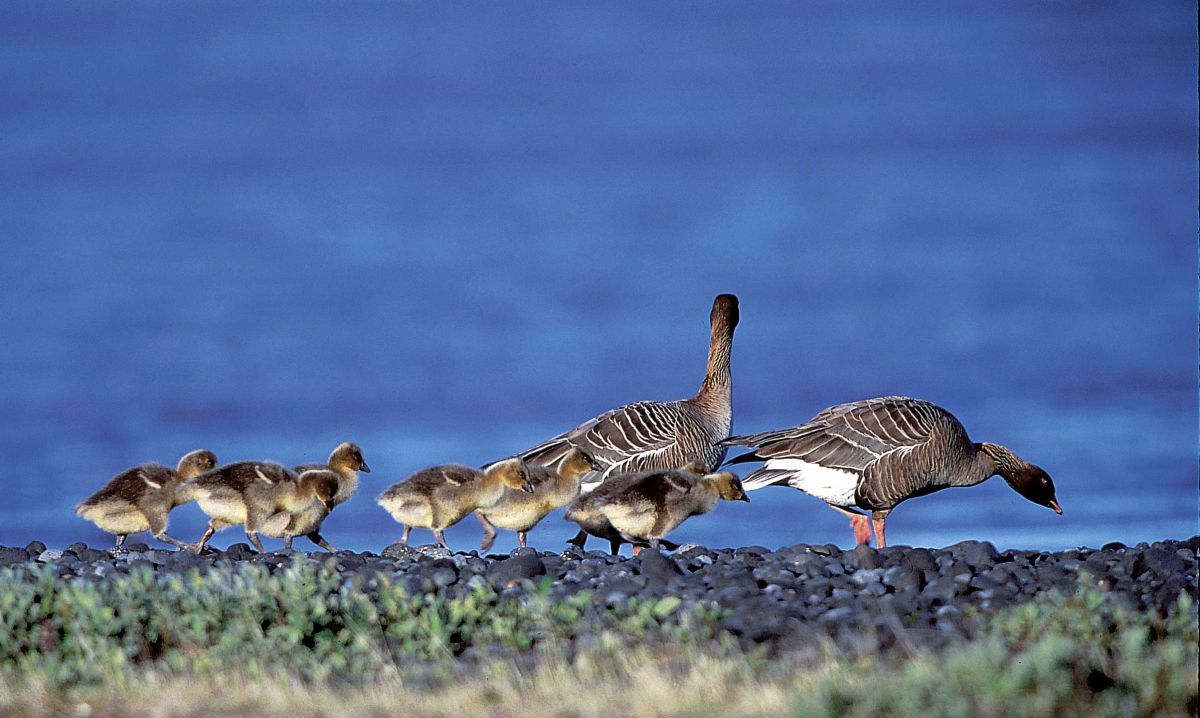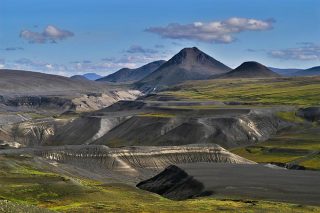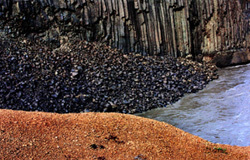'Landsvirkjun'
Tag Archive
Jan 01 2004
1 Comment
ALCOA, Barclays, Ecology, Economics, Kárahnjúkar, Landsvirkjun, Laws, Pollution, Surinam
Briefing from International Rivers Network and Friends of the Earth
January 2004
The article in pdf format
EXPOSING THE EQUATOR PRINCIPLES
Barclays bank are helping to arrange a $400 million loan to an Icelandic power company (‘Landsvirkjun’) to construct the countries biggest hydropower project (‘Karahnjukar’) in the Iceland Central Highlands, the second largest remaining wilderness area in Europe, in apparent breach of the banks own green project finance principles the Equator Principles and for the primary purpose of providing cheap electricity for a new aluminium smelter (‘Fjardaal’) for the aluminium producer Alcoa. Read More
Jan 01 2004
ALCOA, Amazon, Australia, Climate Change, Ecology, Economics, Impregilo, India, Kárahnjúkar, Landsvirkjun, Laws, Pollution, Repression, Surinam, WWF
‘Damned Nation’ is very good on the spiel behind the Karahnjukar project and Alcoa.
The Ecologist
v.33, n.10, 1. Jan 2004
Costing over $1 billion, the Karahnjukar hydroelectric dam in Iceland is a hugely controversial project. Mark Lynas journeyed to the blasting face, hoping to work out for himself whether this industrial elephant is green or brilliant-white.
 Reassurances in the Impregilo work camp canteen Read More
Reassurances in the Impregilo work camp canteen Read More
Nov 29 2003
8 Comments
ALCOA, Barclays, Bechtel, Corruption, Dams, Democracy deficit, Ecology, Economics, Greenwash, Guðmundur Páll Ólafsson, Impregilo, Kárahnjúkar, Landsvirkjun, Laws, Ólafur Páll Sigurdsson, Pollution, Repression, WWF
The Guardian, November 29, 2003
‘Power Driven’ appeared in The Guardian Weekend in 2003 and made a major impact in Iceland. It is still the best main stream analysis of many key issues at stake and an excellent overview of the social background.
In Iceland, work has already begun on a colossal $1bn dam which, when it opens in 2007, will cover a highland wilderness – and all to drive one US smelter. Environmentalists are furious, but the government appears determined to push through the project, whatever the cost. Susan DeMuth investigates.
North of Vatnajokull, Europe’s biggest glacier, lies Iceland’s most fascinating and varied volcanic landscape. Ice and boiling geothermal infernos meet at the edges of the glacier, and then the largest remaining pristine wilderness in western Europe begins – a vast panorama of wild rivers, waterfalls, brooding mountains and mossy highlands thick with flowers. Read More
Jul 18 2003
2 Comments
ALCOA, Barclays, Cultural, Ecology, Economics, Greenwash, Kárahnjúkar, Landsvirkjun, Laws, Pollution
International Rivers Network
The $400 million loan for Iceland’s National Power Company
On July 9, 2003, a $400 million revolving credit was signed by Iceland’s National Power Company (Landsvirkjun) and a consortium of 19 banks. The mandated arrangers of the loan are Barclays Bank (UK), Sumitomo Mitsui Banking Corporation (Japan), SEB (Sweden), and Societe Generale (France), with shares of $31 million each. The other members of the consortium are CDC IXIS (France), Danske Bank (Danmark), DePfa Group (Germany/Ireland), Dexia Group (France/Belgium), Fortis Bank (Netherlands), Islandsbanki (Iceland) and Landesbank Baden–Wuertemberg (Germany), with $25 million each; Deutsche Postbank (Germany), KBC Bank (Belgium) and Norddeutsche Landesbank Girozentrale (Germany), with $17 million each; and BNP Paribas (France), Deutsche Bank (Germany), JP Morgan (USA), Kaupthing Bunadarbanki (Iceland) and Landsbanki Islands (Iceland) with $10 million each. Read More
Jun 26 2003
ALCOA, Cultural, Ecology, Economics, Kárahnjúkar, Landsvirkjun, Laws, Pollution

International Rivers Network
1847 Berkeley Way, Berkeley, CA 94703, USA, irn@irn.org
An Analysis of the Karahnjukar Hydropower and Reydaral Aluminum Smelter Project in Iceland
Read More
Jun 02 2003
ALCOA, Dams, Democracy deficit, Ecology, Greenland, Greenwash, hydropower, Impregilo, Kárahnjúkar, Landsvirkjun, Laws, Pollution, Þjórsárver
Einar Þorleifsson and Jóhann Óli Hilmarsson
World Birdwatch vol. 25 no. 2, June 2003
As reported in the previous issue of World Birdwatch (25(1):7), a huge dam is being built in a remote part of Iceland to supply hydroelectric power for an aluminium smelter. The development is vigorously opposed by Fuglaverndunarfélag Íslands (Icelandic Society for the Protection of Birds, ISPB, Birdlife in Iceland). ISPB’s Einar Ó. Thorleifsson and Jóhann Óli Hilmarsson discuss the likely impacts on the unique wildlife and scenery of this pristine environment. Read More
Jan 15 2003
ALCOA, Denmark, Ecology, Greenland, Greenwash, Impregilo, Kárahnjúkar, Landsvirkjun, Laws, Þjórsárver

The proposed dams in Iceland are likely to completely destroy the nest sites of 1050-1350 pairs of Pink-footed Geese (equivalent to four per cent of the UK wintering population). In addition, thousands more are likely to be affected less directly by impacts such as the effects of hydrological changes on the birds.
Cambridge, UK, 15th January 2003
The Icelandic Government will put thousands of pairs of nesting Pink-footed Geese at risk by sanctioning two hydro-electric schemes, BirdLife International said today. Iceland has almost 90 per cent of the global population of this small goose, almost all of which winter in the UK, mainly in East Anglia and Scotland [1,2].
“BirdLife International estimates that as many as one in seven of the Pink-footed Geese that visit the UK in winter could be affected or displaced by these hydro-electric schemes”, said BirdLife Europe’s Conservation Manager, Szabolcs Nagy. “The two affected sites – Utherad and Thjarsarvar Important Bird Areas (IBAs) – are globally recognised, but Iceland seems determined to renege on its international conservation commitments and to damage and destroy substantial portions of these sites.” [3,4,5] Read More
Sep 27 2002
1 Comment
ALCOA, Corruption, Ecology, Economics, Kárahnjúkar, Landsvirkjun, Laws, Pollution, Workers Rights, WWF

Ethical Consumer.org
September/October 2002
Scott Clouder profiles the company that links BacoFoil with the US treasury secretary, a Mexican sweatshop and an Icelandic wilderness.
At the end of July Alcoa, the world’s largest producer of aluminium, signed an agreement with Iceland’s national Landsvirkjun power company and the Icelandic government to build a large smelting plant in the country’s eastern wilderness. Alcoa is offering to finance the construction of an adjoining hydropower plant in an undisturbed area north of Vatnajokull Glacier, including access roads and a large dam. This will enable it to buy electricity cheaply – which is useful considering around 60 percent of the cost of producing aluminium is the cost of energy. The project is set to be one of the largest investments ever in Iceland, and will change the course of two of the country’s largest glacial rivers and turn various valleys and canyons into reservoirs. All this is proposed for an area which, at three thousand square kilometres, is the second-largest wilderness in Europe. Nature conservation organisations all over the world have campaigned to have the place designated as a national park but the construction will disturb about half of its 22 protected sites of special natural interest and an important reindeer calving area.(1)
Paradise Lost?
Iceland’s State Planning Agency originally vetoed the plan because of the environmental impact, but the decision was overruled by the environment minister, Sif Fridleifsdottir. Read More

